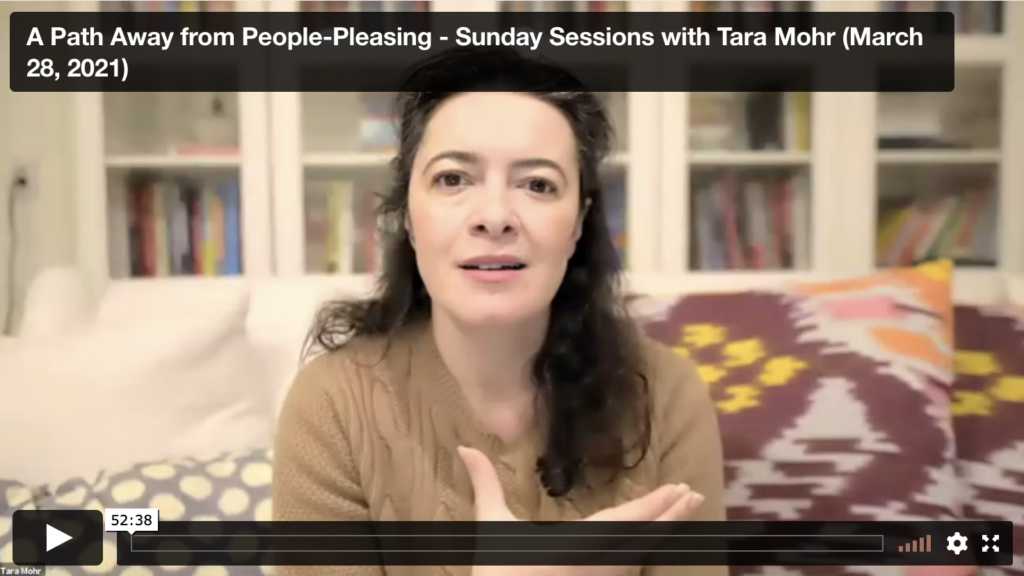At the end of my workshops, I’m fond of asking people, “What’s something that really landed with you today – an aha moment, or major takeaway that really resonated?”
A couple weeks ago, when I asked this question, something surprising happened: many people mentioned a concept that we’d talked about only in passing. I knew if it had stood out that much from a short mention, it must be important.
The concept was this: when we people-please, we are also being dishonest in our relationships. That is not good or bad, it just is something to know and explore the consequences of. We devoted an hour to exploring that this Sunday. If people-pleasing is something you struggle with, I invite you to explore with us, through the video and the reflection below.
I’ll share with you some of our exploration – the questions I asked our community, and how we answered.
How does people-pleasing show up for you?
Not sharing the truth that I feel hurt by something. Taking on work I really didn’t want to do. Allowing myself to be talked over. Not telling my partner what I really need. And of course the classic: I hated the haircut and pretended I liked it!
What are the costs of people-pleasing?
My integrity. My energy. I ended up with a car I didn’t truly want to buy. I ended up in a committed relationship I didn’t really want to be in. It cost me myself.
The costs of people-pleasing that our community spoke to were very high. It was powerful to witness how many of us are walking around with our energy significantly depleted, our mood impacted, and our sense of integrity fractured because of the ways we’ve compromised ourselves or denied our needs.
But it wouldn’t be fair to talk about the costs of our people-pleasing without also looking squarely at the benefits. So we asked ourselves:
What are the benefits of the people-pleasing we’ve done? What did it get us?
Social harmony. Smoothing the waters. The illusion of peace. Superficial belonging. Avoidance of conflict. Staying safe, or feeling safe. The paycheck. Short-term validation.
There were clear themes in the group on this question of benefits: people-pleasing brought a certain kind of relational harmony (on the surface level), a sense of safety, and momentary benefits – often with a longer term cost.
Where did the people-pleasing lead you in the situation/relationship over time?
Alienation. Disconnection. Withdrawal. Losing myself. Anger. An eventual blow up. Acting out.
And then, we went to the layer underneath. What was driving the people-pleasing? What was the fear underneath?
Fear of abandonment. Fear of being judged. Fear of painful feelings. Fear of shame. Fear of being seen as too needy. As too demanding. Fear of making it worse. Fear of hurting others or causing pain. Fear of conflict.
We began to explore how we might change the people-pleasing patterns that are not serving us. We talked about how honesty does not mean 100% transparency in all relationships. Instead, it’s an art – and a discernment process – to explore what kind of honesty, and what depth of honesty, we want to bring to any given situation. Sometimes we are honest about our boundaries, but not the reasons for them. Sometimes, the healthy thing is to make honest choices, but not say too much. Sometimes, it’s time to stretch ourselves and be more courageously honest.
With all that’s nuanced and context-dependent here, I think a few things are for sure: doing the discernment consciously is very different than simply defaulting to unconscious people-pleasing. Knowing the costs of people-pleasing, particularly the cost to our own energy, and sense of connection with others, is key. And no matter what we decide to share, we can always begin by being honest with ourselves.
Through this simple exploration – 7 short, open-ended questions, each no more than a few words long, we did a lot of good work. Those seven bolded questions above are “coaching questions.” You can ask them of yourself, and journal about them, or talk them through with a friend, with each of you having time to share.
If you are intrigued to ask more coaching questions of yourself, and learn how to ask them wisely of others, you can visit here to learn all about my newest course, The Coaching Way.
Love,
Tara
P.S. For the full video session on people-pleasing, visit here or click on the image below.
Photo by Jonas Jaeken








